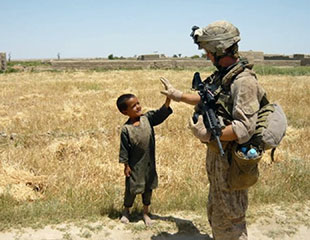Marine Combat Veteran Felt Lost Before Finding His Purpose
3-minute read
Marine Combat Veteran Felt Lost Before Finding His Purpose
3-minute read
At 19, Sam was sent to Afghanistan on his first deployment as a U.S. Marine. His life as an antitank missile gunner and riflemen’s scout experiencing combat quickly felt serious and real.
“When we lost our first guy and then the second and third — and then you start seeing the suicides happening,” Sam says. “You kind of have to experience it for yourself to realize that it’s real.”

Marine Turned Firefighter Takes Charge
Sam transitioned out of the military after four years of service. Through both good and bad days, he felt lost. Feeling adrift in the world was something that his Veteran friends experienced too.
“It seems like everyone is kind of lost,” Sam says.
Ignoring his emotions and his trauma was like rolling a snowball down a hill: The more Sam tried to get away from his challenges, the bigger they grew.
“It’s that mix of depression, anxiety, anger, the unwillingness to kind of keep going. It’s that mix of emotions that really takes effect,” he says. “It got to a point with the anxiety and anger that it was just getting worse.”
When Sam’s romantic relationship ended, he reacted with frustration and anger at the situation, rather than reflecting on the deeper issues that led to the breakup. “It was definitely a very low point,” he says. At the same time, Sam was in school to become a firefighter, which required him to have physical and mental health checkups.
“And that’s pretty much when I decided to go start talking to someone,” Sam says. “I knew that there was an outreach center right down the road from where I live, so [VA] just set me up an appointment there.”
After meeting with the outreach center’s director and learning about the options for care, Sam started visiting the center regularly for therapy. He went every two weeks and then adjusted to once a month to accommodate his work and school schedules.
To visit a community-based outreach center, “you don’t really need a referral or anything,” says Sam. “You can just walk in and set something up or just ask to talk to someone.”
Getting an outsider’s perspective and feedback helped Sam process his experiences and emotions. It was equally healing for Sam to find a new purpose.
“I teach at a fire academy, and being able to give that mentorship or that guidance to people coming through, that’s what helps me the most,” he says.
“When it comes to getting help, they’re not going to knock on your door,” Sam says. “So you have to make that step or do that walking.”

